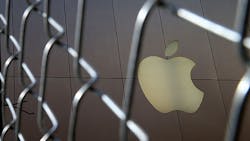Apple, Microsoft, Others Say 'Didn't Shift Profits' in Australia
SYDNEY -- Apple (IW 500/4), Google and Microsoft on Wednesday defended their corporate tax structures at an Australian parliamentary hearing, rebuffing allegations they were designed to shift profits offshore to avoid paying taxes.
The three firms also told the upper house Senate inquiry into corporate tax avoidance, which held its first day of hearings in Sydney, that they were among 12 technology companies being audited by the Australian Taxation Office.
There have been increased efforts by governments around the world, including Australia, to crack down on multinational firms that use complex corporate structures to lower their tax bills.
"The Australian public don't accept that the structures that are being created by these companies are necessarily genuine and there is a strong sense out there that companies such as yours... also have a great moral and social responsibility to give more back to this community," the hearing's chair Sam Dastyari said.
There was a general perception, he added, "that the structures that have been created within your firms, be it through Ireland or Singapore or through the U.S.... have been designed to minimize your tax obligation in this country."
The tech firms' representatives in Australia said they were paying all the taxes they owed under the country's law.
The inquiry heard Google Australia in 2013 made Aus$358 million (US$275 million) in income, generated profits of just over Aus$46 million in profit and paid Aus$7.1 million in tax.
Google's Australia and New Zealand managing director Maile Carnegie told the inquiry she could not reveal how much revenue in total was generated in the country.
But she said some of the revenue generated in Australia such as from advertising was booked in Singapore, its Asia-Pacific headquarters, which has lower tax rates.
Carnegie said Google had not structured its global network to minimize its tax obligations but to be competitive with its peers.
She added that the firm paid most of its tax in the United States, where its head office is based, as that was where the bulk of its risk and investment was made.
"These are international tax arrangements. What Google is doing in Australia is very, very similar to what Australian companies are doing outside of Australia," she told the inquiry.
"I am not sitting here today trying to defend whether those practices... are right or wrong. They are simply the way the global tax system is currently working.
"We're trying to operate within that and if the government chooses to create a different system, then obviously we will abide by that."
‘We Haven't Shifted Any Profits’
Apple's Australia and New Zealand managing director Tony King said his firm last year reported revenue in Australia of Aus$6 billion and generated a net profit of Aus$250 million for a tax bill of about Aus$80 million.
"We haven't shifted any profits. We booked all of our revenues here, all of our costs," King added.
Microsoft's global tax chief Bill Sample said a large chunk of the revenue generated in Australia was taxed in Singapore.
"Aus$2 billion in (Australian) software product and services revenue booked in Singapore and a little over a Aus$100 million of consulting services revenue booked in Australia," Sample told the inquiry.
Australia made closing corporate tax loopholes and endorsing a common reporting standard to increase transparency a key focus of the G20 meetings last year when it assumed the rotating presidency.
Treasurer Joe Hockey, who last year said the practice of corporations shifting profits amounted to "theft", wrote in a column for The Australian newspaper Tuesday that companies had to "pay their fair share of tax."
"We will continue to ensure multinationals pay taxes in Australia on the income they earn here," Hockey said, adding that such a push was part of the country's need to overhaul its tax system.
Glenda Kwek, AFP
Copyright Agence France-Presse, 2015
About the Author
Agence France-Presse
Copyright Agence France-Presse, 2002-2025. AFP text, photos, graphics and logos shall not be reproduced, published, broadcast, rewritten for broadcast or publication or redistributed directly or indirectly in any medium. AFP shall not be held liable for any delays, inaccuracies, errors or omissions in any AFP content, or for any actions taken in consequence.
